Jonathan Dodd‘s latest column. Guest opinion articles do not necessarily reflect the views of the publication. Ed
My ex-brother-in-law, before he became an ex-brother-in-law, once told me this story. He was temporarily embarrassed for work, as my mother used to say, and he went to see an employment adviser. After asking him to tell his story, the adviser sat back and listened. Then he sat up and said this – ‘I sit in my office every day, and good people like you come in and tell me your woes, and I know exactly what you need, which is the one thing I can’t do for you, unfortunately. In my experience, all anyone needs to sort out almost any human problem or difficulty is the application of a fat cheque!’
I’ve spent the intervening decades thinking about this. Not exclusively, but it’s been there, on my mind, with a whole plethora of other thoughts and ideas, on my intellectual compost heap, simmering away before being reused in some hopefully fruitful way. Like this. I haven’t yet come to a final conclusion, because my jury’s been out for so long I should probably check to see if they haven’t nipped out to the pub for one of those so-called ‘swift ones’.
It is an almost true statement
I believe, at this stage in my deliberations, that it is an almost true statement. Just think about any difficulties or frustrations in your life that would disappear entirely, or at least become less significant with the application of a fat cheque. A leaking roof, an ailing car, the opportunity to leave that horrible job, the chance to see long-missed loved ones on the other side of the world, the list is endless. There are some things, obviously that couldn’t fundamentally be changed, but circumstances around them would almost certainly become easier if there was money there to apply.

I think of the Beatles song – ‘Money Can’t Buy Me Love’, and I wonder. It could, for instance, buy something that looks and feels a bit like love, and as long as you didn’t mistake it for the real thing it might help a lot. And I think of the saying – ‘Money is the root of all evil’, which, frankly, is ridiculous. Some crime, I agree, is based on the desire for money, as well as some nasty behaviour, but evil just takes root in the minds of some people, and it chooses its battleground.
Some kind of destructive insecurity
Evil is evil. It’s more likely to be rooted in the need for power, or in some kind of destructive insecurity. It reminds me of a bumper sticker I once saw in the USA. It said this – ‘GUNS DON’T KILL PEOPLE. PEOPLE KILL PEOPLE’. This is an almost true statement too. However, it is also true that Canada has the same numbers of guns per person as in the USA, but only a tiny number of gun crimes.
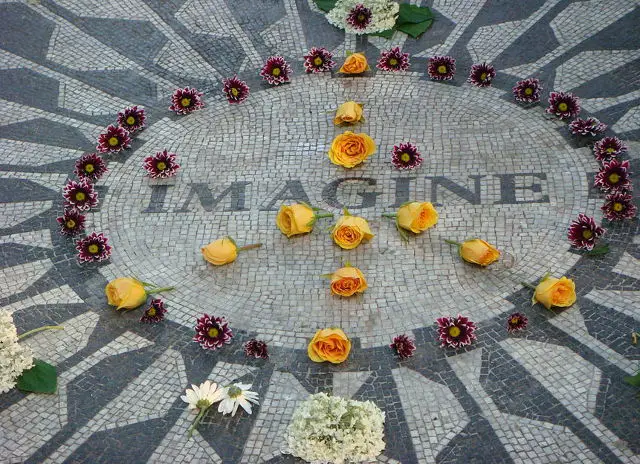
Perhaps it would be just as true to have a bumper sticker that says this – ‘GUNS DON’T KILL PEOPLE. AMERICANS KILL PEOPLE’. A lot of blame goes to the gun lobby and the power they wield, and money has to be involved there too, but I still don’t think that you can blame money for any of these things. It’s just one of the things that people with bad intentions use in their nefarious activities.
An equilateral curve heptagon
Anyway, there’s no such thing as money. It’s just a physical representation of the relative value of one commodity compared to another. You could swap an apple for an orange with a friend, or you could agree that they’re both worth 50p and buy and sell them to each other instead. It’s exactly the same thing, apart from the small metal discs – seven-sided in this case. An equilateral curve heptagon, no less.
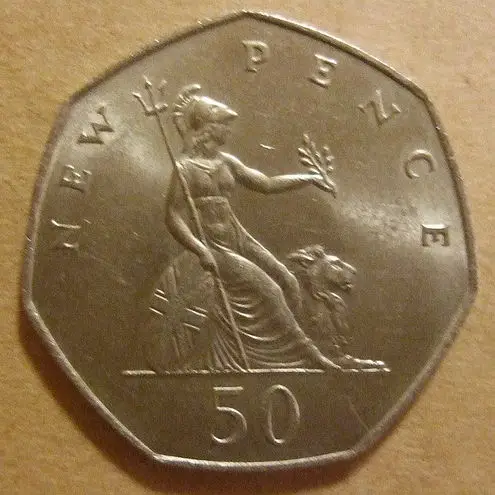
On one of my courses once, I was introduced to the idea of ‘nominalisations’. This is a lovely word, and it’s another of those things that’s another almost true statement. A nominalisation happens when something that doesn’t actually exist gets given a name, and people start thinking about it as a thing. The almost perfect example of this is stress. Before the second half of the last century nobody had stress, because the word wasn’t used to describe these symptoms until then. It’s interesting (at least to me) that it entered directly into most languages, and never needs translating. That’s because it’s such a new idea.
Can you put it in a wheelbarrow?
We now have a sort of stress exchange, where some people give other people too much stress, or force stress on them, so they become overloaded with stress, and people think about it as if it’s a thing. On my course the instructor gave us a very simple test. ‘Can you put it in a wheelbarrow? If you can’t, it’s a nominalisation, it’s not a thing.’ That appealed to my mind very much. And then I found a quote by Hans Selye, who coined the concept in the first place – “Stress, in addition to being itself, is also the cause of itself, and the result of itself”. Fantastic.

Money used to be made of valuable metals, so its value was real. Then it became a representation of an actual hoard of gold in the vault of the Bank of England, and now it’s a promise, as in our bank notes – ‘I promise to pay the bearer…’. But in reality most of our money lurks in computer records and has no actual existence at all. Try putting your online bank balance in a wheelbarrow.
Sometimes trouble just arrives unbidden
And at some point the value of things stopped being anchored to the things themselves. Everything becomes relative, as in your house, which is only worth what someone would pay you for it. Our financial problems are mainly caused by buying things off the back of an apparent rise in our worth because the price of houses has gone up. It’s not just us though, because our governments have been just as profligate.
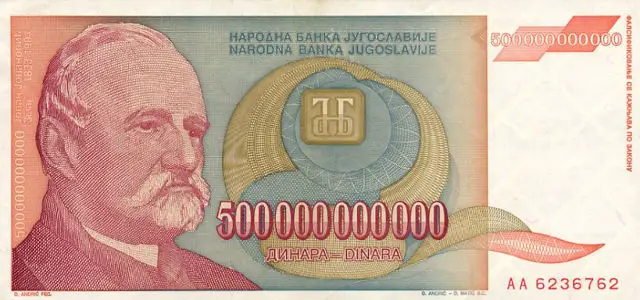
So I’ve finally circled back to the fat cheque principle. Sometimes people get into trouble because they’ve been able to spend lots of money that didn’t really exist. Sometimes trouble just arrives unbidden. I suspect the Greeks don’t think they’ve done anything wrong, and all they want is to be given a fat cheque. Of course, that makes it easy for them to blame the people who refuse to provide the fat cheque rather than themselves for getting into trouble in the first place. There go several more things you can’t put in a wheelbarrow.
The fat cheque’s in the post
And actually, what would really happen if the Greeks were given a fat cheque? I’m assuming that the worry here is all about inflation. Everyone knows about Germany in the 1920s, but that didn’t last long, and there they were a decade later, ready and raring to take over the world. There were lurid stories at the time of workers being paid so much paper money every day that they had to take it home in wheelbarrows.
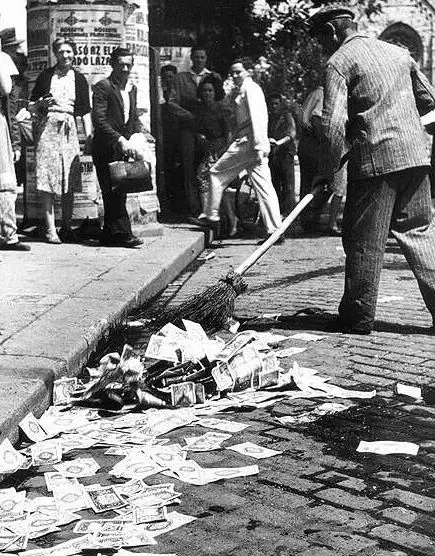
I become hopelessly confused when I hear economists talking about money, and I suspect they don’t understand it any more than I do. And I rather suspect that if I woke up one morning with a completely clear understanding of the whole money thing and had a precise plan that would solve everyone’s difficulties, nobody would listen to me.
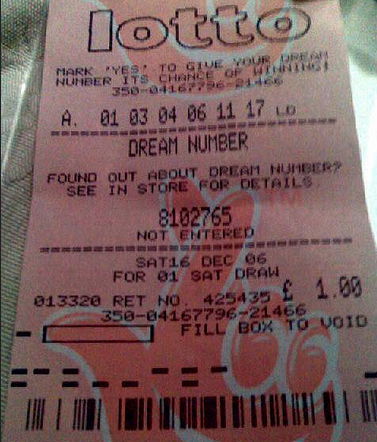
The reality, for me, is actually very simple. Every week the Lottery utterly fails to give me the fat cheque that would sort out all my problems and difficulties.
If you have been, thank you for reading this. The fat cheque’s in the post.
Image: crossroads_foundation under CC BY 2.0
Image: imlsdcc under CC BY 2.0
Image: Killagb under CC BY 2.0
Image: woodysworld1778 under CC BY 2.0
Image: jdhancock under CC BY 2.0
Image: Sealle under CC BY 2.0
Image: Timur lenk under CC BY 2.0
Image: niff under CC BY 2.0





